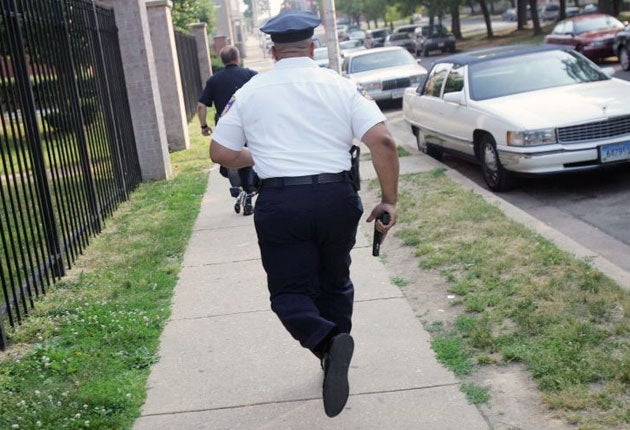Mark Hughes in Baltimore: Why the courts can't keep up with crime
The latest episode of our crime reporter's job swap with his counterpart on the 'Baltimore Sun' looks at how justice works on either side of the pond

On the corner of Heath and Light Streets, a young man and woman sit on the kerb with their hands cuffed behind their back. The woman, badly emaciated, is a prolific drug user and the man, too, is well known to police. This time the pair are being arrested for loitering and refusing to leave the area after being told to do so by a police officer.
They will be charged, but their case will never make it to court. Instead they will appear before Central Booking and Intake Center and be released. The offence is considered abated by arrest. In other words a temporary problem solved by a night in the cells.
They are an unwitting but perfect example of the flaws in Baltimore's justice system.
These arrests took place during a community walk in the Southern District, members of which applauded what they saw as a great example of community policing.
But when it comes before the State's Attorney, the office responsible for prosecutions in the city, the charge will be dismissed due to a lack of evidence.
Patricia Jessamy, the State's Attorney, who described the relationship between her office and the police as "schizophrenic", said it was an historic grievance. "We love the police and we rely heavily on the police. But we are not a rubber stamp for them."
That statement is backed up by figures that show that in the past year, out of almost 55,000 cases the police presented to the State's Attorney's Office, almost 10,000 were dropped because the State's Attorney's office decided there was not a realistic chance of conviction and declined to prosecute. Another 15,000 needed "substantive changes" meaning that, in 45 per cent of the cases, police were not preparing the cases properly.
"If we are not given enough evidence or if they do not follow through on investigative things we need to get a conviction then there are problems. Some crimes are so minor and police officers will arrest individuals for it and we think that [a night in a prison cell] is punishment enough."
Statements such as these have led her detractors to label Mrs Jessamy as weak on crime.
She says the blame for the number of abandoned cases lies with police officers who are making quick and easy arrests to hit targets issued by their commanders.
The police accept there is a problem, but say it is getting better. Spokesman Anthony Guglielmi said: "Relations with the State's Attorney five years ago were horrendous but since the commissioner took over [in 2007] we have come a long way. We can go a lot further, definitely, but we are on the right path.
Mr Guglielmi said the force has focussed on training the officers more thoroughly in issues such as probable cause – the standard of suspicion a police officer must satisfy before he can arrest a suspect – to try and eliminate weak charges. But he says it will take time.
In the UK the system was changed in 2003 to eliminate the suggestion that police officers would charge suspects simply to hit performance targets. Charging power was taken away from the police and given to the Crown Prosecution Service (CPS).
But that is not to say that tension has been eliminated. The relationship between the CPS and the police can be strained, especially when a force is told that a case, on which they have spent considerable time, is not strong enough for trial.
It is not only the weak charges brought by the police which are frustrating Mrs Jessamy's attorneys. She has also criticised the police for not turning up to court. A case cannot proceed if an officer does not turn up.
Last year, of the 16,500 cases that were abandoned, almost 3,000 were because police did not attend court.
But the most serious issue is of witness intimidation. With many of the cases going through Mrs Jessamy's courts involving members of gangs, witnesses are continually being frightened into not testifying.
Again, of the 16,500 cases abandoned last year, almost 3,000 were because witnesses did not appear at court. A further 665 were discontinued because witnesses changed their stories, most likely due to intimidation. In one instance a witnesses' home was firebombed. And underworld figures were so brazen in their intimidation, a video was circulated on YouTube called Stop Snitching.
Witness intimidation occurs in the UK as well, especially in cases involving gangs. But while in Baltimore safe houses and relocation can be afforded to vulnerable witnesses, other methods to protect them such as allowing them to give evidence behind a screen, via video link or using voice-changing techniques to mask their identity, are not as common as in British courts.
Mrs Jessamy insists her court provides safety for witnesses outside of the courtroom. But why, if no real protection is offered inside court and intimidation is rife, would anyone want to testify against a gangster or murderer?
Mrs Jessamy said: "It is real easy to say you are not going to do anything. It takes courage to stand up and do something. And if you do not do anything, that criminal continues to be a threat, not just to you, but to everyone in the community."
Subscribe to Independent Premium to bookmark this article
Want to bookmark your favourite articles and stories to read or reference later? Start your Independent Premium subscription today.

Join our commenting forum
Join thought-provoking conversations, follow other Independent readers and see their replies